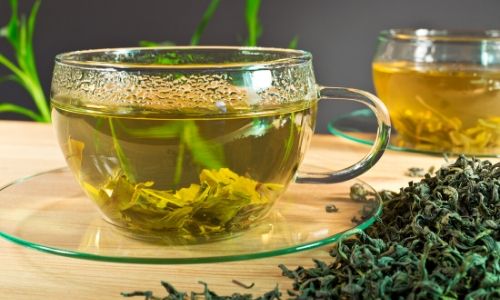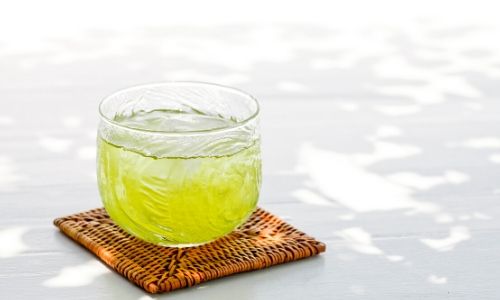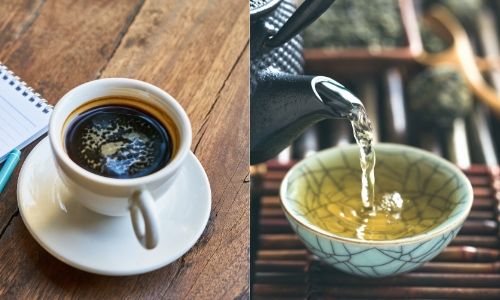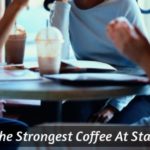Green tea versus coffee. It was going to happen at some point.
Everyone, at least one in their lives, has to choose between green tea and coffee. For one reason or another.
This is why I'm not going to make a ''which is best'' kind of post.
Today's post is all about picking one, based on your current need/goal/mood maybe ?
The point is that both coffee and green eta have a place of their own in each person's cup, but maybe for different occasions.
So let's break them down a little, and see which is best for what scenario. Starting with the most basic definition of both drinks.
Table of Contents
What is green tea ?
Green tea is probably the most well known type of tea out there. It's especially popular in Asia but it's also found a home in most fo Western civilization.
Like black tea, white tea, Pu'erh and Oolong tea, green tea is made from the leaves of the Camellia sinensis plant.
This is the original tea plant, the one the Chinese first picked when tea was in its early days. Thousands of years ago.
Green tea especially is made from the younger leaves of the tea plant. The leaves are picked, allowed to oxidize/bruise for a every short amount of time, then heat treated to retain their current flavor and oxidation level.
Most of the time the leaves themselves will end up being very dark green, and may break due to the processing. Most retain their current shape and size.
The resulting tea from these leaves isn't always light green. The way the leaves are processed can yield tea from light gold to amber to light green, and only a few end up green.
An extensive guide on green tea can be found right here.
Green tea does contain some caffeine, as all teas do. I cannot give you a clear estimate since this depends heavily in several factors:
- the soil/nutrients the plant was fed with
- the year's crop (vs previous years)
- weather during the growth period
- how much you let the leaves steep
- how many leaves you use per cup
All of these factors mean you can get a cup of green tea with caffeine ranging from 30 mg to 100 mg, and you won't really know unless you test that particular cup.
Keep in mind the the caffeine quantity found on food labels is there as a way to avoid a lawsuit, but is often just a guideline and not a true representation of exactly how much caffeine there is.
What is coffee ?
Coffee is the brew resulting from ground coffee beans mixed with hot water.
The most common coffee beans use are Arabica, and they're the most flavorful of the bunch. Second is Robusta, a much stronger but bitter coffee.
Much like tea, coffee beans have to be processed before they can become actual coffee. Here we have the roasting levels to keep in mind, because they will influence the flavor very very much.
And then we have the grind size. Simply put, after the beans are picked and dried and roasted, they're ground into various sizes.
The smaller the size, the quicker the caffeine and flavor extract (like espresso).
And like with tea, caffeine for coffee isn't really easy to estimate. There are a few pointers, though.
We know that Robusta has almost twice the caffeine of Arabica beans.
And we know that a regular shot of espresso clocks in at about 60-70 mg of caffeine per 1 oz/33 ml. A standard shot of espresso usually uses about 7-9 grams of ground coffee.
Of course, these values can vary from coffee brand to coffee brand. One brand's Arabica could be very strong, but if you use too little fo it your resulting coffee would be weak.
Most folks know about coffee more than they do about green tea, so I think we've covered the basics here.
Deciding between green tea and coffee
Alright, how do you even decide between these two ?
If you've had both at some point, you know their flavors and you know which you like best.
But what if flavor isn't what's driving you today ? What if it's not for you ?
Well, let's look at different scenarios since we all take decisions based on the factors around us.
Keep in mind that these are just suggestions, you can end up choosing whatever you like. I'm just helping you make up your mind.
The way I'm comparing green tea and coffee here is more of a ''what can I get out of this drink'' mindset than anything else.
1. If you want more health benefits
Health benefits are all the rage in the past few years.
Don't get me wrong, they're important and we need them and are definitely something to keep in mind.
But they're becoming a bit loud and overstated and we seem to be making too much fuss over it.
That being said, there are some health benefits to both coffee and green tea. But you have to put in some work as well.
Both coffee and green tea contain antioxidants, and those help repair or stave off damage from free radicals. In short, free radicals are a natural result of a very poor lifestyle choice, or serious illnesses.
In even simpler terms, if we don't take care of our health beforehand, the antioxidants won't help all that much. A balanced, healthy eating plan, regular exercise and simply getting out in the sun and fresh air are major factors.
Get those done and you'll notice the antioxidants helping even more.
Green tea has slightly more antioxidants
If you still want to go after the antioxidants and really want to know which you should pick, go for the green tea.
The difference isn't groundbreaking, but there's a difference alright.
Of course, this is only true if you take your green tea with no sugar. You see, sugar and any form of sweetener will cancel out quite a few of the antioxidants (and the caffeine).
A green tea latte is still a latte, sugar and all.
So if you can develop you palate to get used to pure green tea, wonderful. You're on your way to really getting better.
If you want to take this a step further, try matcha. It's still a form of green tea, but more concentrated and many people claim it tastes a little sweet/buttery.
2. How strong do you want your caffeine ?
If you're looking for a good way to start your day. both green tea and caffeine are a valid choice here.
There's a difference in how they work though, and you should keep that in mind.
Gentle wake up or a strong kick
Green tea (like any other true tea) is going to wake you up but in a fairly gentle way.
This is because it has L-theanine, a sort of calming agent that occurs naturally and bonds with caffeine molecules. What does this mean ?
It means the caffeine will work slower, with a more controlled release. The mix with L-theanine really helps you focus more than get you jittery.
On the other hand, you can get a cup of coffee that will really get you going. It will send a rush o adrenaline thorough our body that will jumpstart your day.
If this is what you're after, then go for it because it's really going to work faster and harder than green tea.
It might trigger a bowel movement though, so keep that in mind. Some folks are more sensitive to coffee than they are to tea.
Okay, but which has more caffeine ?
Caffeine levels are fairly different between green tea and coffee.
While the exact measurement of caffeine isn't clear for either of them, most studies and folks' personal experience agree that coffee is stronger than green tea.
That being said, if you brew green tea at home you can make your own very concentrated version.
It's also good to note that the amount of caffeine isn't maybe the most important factor here.
Overloading on caffeine is kind of easy, and it might be better to space out smaller doses throughout the day.
For example a cup of green tea in the morning, one a little before lunch, and the last should be at least 5-6 hours before going to sleep.
These will keep you up and running better than just one strong coffee in the morning.
3. Coffee and green tea offer very different flavors
If caffeine and health benefits aren't your concern, then you're probably wondering about flavors.
Alright, this section is going to be very, very subjective.
Remember that both green tea and coffee can be modified to suit your particular taste.
Coffee goes well with milk, green tea doesn't
Both drinks are kind of bitter by nature.
Well, coffee is bitter and harsh. Green tea is rather astringent and can become bitter if brewed too long.
So that means it might make you want to add some milk or creamer into the mix, to cut through all that.
Coffee goes with milk, very very well. If milk is your preferred way of mellowing a drink, then you should stick to coffee.
There's also a vast amount of choices - exactly what kind of coffee are you getting ? If it's with milk it can be almost anything espresso based.
What about green tea ?
Well, unfortunately green tea with milk don't mix very well. It's the grassy, green tones in the tea that are going to clash with the buttery notes in dairy milk.
However some folks claim that plant or nut milk might be suitable for green tea.
I've never tried it on y own, but I'm guessing that since both the tea and the milk are plant-based there would be a better mix. Something like green tea with coconut milk might work great.
Green tea comes in many, many flavors
Although green tea doesn't mesh that well with milk, it does have an upside coffee doesn't.
You can find more versions of green tea than you can find pure coffee.
So for example fruity or floral green tea mixes are going to be a great alternative to pure green tea if the flavor is too harsh for you.
Lots of folks opt for a green tea blend, simply because the other notes (like jasmine or citrus or strawberry) help you ignore the harsher parts of the tea.
So keep in mind where you're getting the green tea from. If it's an establishment that offers multiple versions of green tea, consider trying them out.
4. Weight loss effects are pretty much the same
Alright, if weight loss is something you're after and you've got supplements that claim they've got green tea or coffee extract, stop right there.
There's nothing wrong in trying to take care of yourself, but often supplements aren't very well put together and don't give the body exactly what it needs.
In that case, it won't really matter if the capsules are coffee or green eta based, their overall effect will be almost the same.
Your healthcare provider should be able to tell you more about this than me, so please check with them as well.
If you're not taking supplements but simply want to drink coffee or green tea for weight loss on your own, stop again.
They may work, or they may not.
It also won't matter too much which you end up drinking, since both contain caffeine and antioxidants.
But neither of them will work very well if there is no plan to exercise and eat healthy as well.
So to sum it all up, if you're looking at coffee and green tea for weight loss, there's a very small difference.
Whichever you take will help you a little, but only to a point. The rest is up to you.
Please remember that any effect these two drinks may have on your health take weeks and months of constant drinking to really show.
Conclusion
I hope this post helped you figure out which drink is better suited for your needs.
Coffee and green tea are not the same, not at all. But in some respects, they act pretty similar. Certainly similar enough to not really matter which you get.
Personally I vote for coffee, simply because I like it a little more than green tea. However I also like black tea a bit more than coffee, so take that into account as well.
If you want to know more about coffee or tea, feel free to check the related articles below. Who knows what else you might find ?


